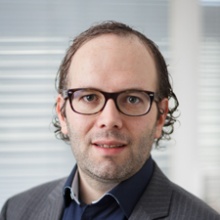Contact
Stefan Kaiser studied Physics at the RWTH Aachen and received his Diploma in 2005. His final thesis "Time resolved investigation of impulsively excited phonon-pair combination states in solids" was performed with Heinrich Kurz at the Institute for Semiconductor Technology focusing on coherent phonon dynamics in perovskites.
From 2005-2009 he worked with Martin Dressel at the University of Stuttgart on optical properties of organic conductors and superconductors receiving his PhD in 2010. During that time he also performed intensive spectroscopy on complex and correlated materials of several kinds. In addition he performed first optical measurements on metamaterials and plasmonic structures with Na Liu and Harald Giessen.
As a Post-Doc and later Scientist and group leader he joined Andrea Cavalleri in 2009 starting the Max-Planck Research Department for Structural Dynamics at the Center for Free Electron Laser Science and at the University of Hamburg that in 2013 became an independent Max Planck Institute for the Structure and Dynamics of Matter.
The research focus in Hamburg was on pioneering experiments in the area of Light Induced Superconductivity in Cuprate High-Temperature Superconductors at temperatures far above the equilibrium transition temperature, as well as in the area of Quantum Many-Body Dynamics of Correleated Electron Systems. Stefan was leading and performing state-of the art pump-probe experiments and pushing the limits of time-resolved infrared and THz-spectroscopy at low temperatures and under extreme conditions, like measuring extreme timescales at sub-cycle response or performing measurements under external pressure. He also runs and participated in related experiments at large scale facilities like the LCLS Free Electron Laser at Stanford, the Diamond Synchrotron Light Source at the Rutherford-Lab, or the THz Free Electron Laser FELBE in Dresden.
In addition, Stefan together with colleagues based at the University of Oxford, and co-workers from the CNR Padova and the Central Laser Facility in the UK build and commissioned the condensed matter beamline of the ARTEMIS project at the Rutherford Lab; a laser based high-harmonics driven XUV light source for time- and angle-resolved photo-emission at extreme time-scales. Later Stefan designed a similar source but with the goal of high energy-resolution for the lab in Hamburg.
In December 2014 Stefan became head of the independent Ultrafast Solid-State Spectroscopy group at the Max Planck Institute for Solid State Research in Stuttgart and was appointed Juniorprofessor at the University of Stuttgart.
In March 2021 Stefan became Professor at the Institute of Solid State and Materials Physics at the TU Dresden.


